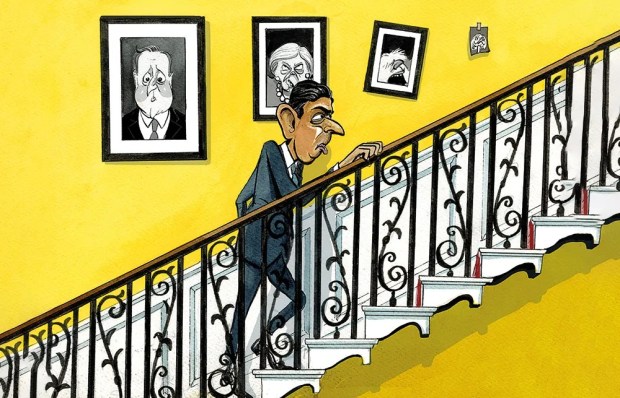With the Conservatives trailing around twenty points in most polls, the outcome of the next election seems all but set. However, even if Rishi Sunak will struggle to lead his party to a fifth term, the scale of a likely Labour victory remains unclear. Whether it’s a backlash from the Muslim community over Starmer’s position on Gaza or Scottish independence, there are plenty of factors that could dampen a Starmer victory parade.
One of these unknowns that could swing the balance for some crucial seats in the next election are that of the new voters from Hong Kong, 125,000 of whom have come to the UK on British Nationals (Overseas) status since China imposed a National Security Law on the city in 2020.
According to new research conducted by the organisation Hong Kong Watch, a London-based NGO, and seen by The Spectator, there are a number of marginal seats in which a highly educated and politically engaged Hong Kong voter base could swing results in the next election. The research estimates that there could be 140,000 new voters from Hong Kong by autumn next year, and has cross referenced National Insurance data with new school enrollments to guess at where they live (as I’ve written recently, the relative financial independence of these new arrivals make them harder to track than your usual migrants). Polling from the University of Liverpool suggests that more than half of the new arrivals would vote Conservative (the Lib Dems come second at 16 per cent, and Labour last at 14 per cent).
There are three Conservative seats in which the number of BNO passport holders may well be bigger than the size of the Tory majority, according to Hong Kong Watch. These are Warrington South, where Red Waller Andy Carter holds with a 2,000 vote majority (there’s an estimated 2,200 BNO voters in the constituency); leafy Wimbledon, where the majority is 628 (more than 700 BNO voters estimated) and incumbent MP Stephen Hammond has already announced he will step down at the next election; and Kensington, where government minister Felicity Buchan has an 150 seat majority but the BNO voter population may be over 600. Targeting the Hong Kong voter base in these seats could make all the difference for the Tories (Labour is the second largest party in Kensington and Warrington South; whereas Wimbledon may well be lost to the Lib Dems).
In addition, there are eight Tory seats where the BNO population is estimated to be more than a third of the size of the majority. In the Greater London constituency of Carshalton and Wallington, for example, Elliot Colburn holds a 629 vote majority, gained from the Liberal Democrats in 2019. There, it’s estimated that there will be over 500 BNO voters by autumn next year. Other such constituencies range from Gedling in the Midlands (BNO voters make up two thirds of Tom Randall MP’s 679 vote majority), to Heywood and Middleton in greater Manchester (BNO voters make up 38% of Chris Clarkson MP’s 663 vote majority), and Chipping Barnet in north London (where BNO voters make up a third of former cabinet minister Theresa Villiers’s 1,212 vote majority).
British-Chinese tend to be family-oriented and financially comfortable
We know relatively little about the political opinions of these Hong Kongers. A 2023 poll from the University of Liverpool found that 36 per cent considered themselves ‘moderate democrats’ and that ‘political factors were the most significant influence on individuals’ decision to leave Hong Kong’ – respondents cited democratic rights like freedom of assembly and speech as causes they cared about such that they left Hong Kong. Explicitly, 52 per cent said they’d vote for the Conservative party.
Anecdotally, this tallies with the Chinese and Hong Kong Chinese Brits that I’ve spoken to. Much like British-Indians who also lean conservative, British-Chinese tend to be family-oriented and financially comfortable. They favour a smaller state (this may be even more the case for Hong Kongers, given the low taxes in their home city) and tend to choose where to live based on the best local schools.
They’re also likely to actively participate in British democracy, given how many of them left Hong Kong because of its authoritarian turn. They turned out in high numbers to the local elections earlier this year, according to an informal survey that Hong Kong Watch did with Hong Konger groups in London and beyond.
So, for the first time ever, British political parties will need to consider and try to understand this new and substantial voter base. Is their support for the Conservative party baked in? Or can Labour and in particular the Liberal Democrats tap into their priorities on, say, housing and education? What does this mean for the government and opposition’s China policy, given these new voters are likely to have a critical view of the People’s Republic? So far, Britain’s new Hong Kongers are a bit of a mystery. But politicians will need to start understanding and reaching out to them soon.
Got something to add? Join the discussion and comment below.
Get 10 issues for just $10
Subscribe to The Spectator Australia today for the next 10 magazine issues, plus full online access, for just $10.





















Comments
Don't miss out
Join the conversation with other Spectator Australia readers. Subscribe to leave a comment.
SUBSCRIBEAlready a subscriber? Log in